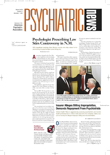What do Theodore Roosevelt, John McCain, and Ruth Simpson have in common? They overcame tremendous odds to become, respectively, a U.S. president, senator, and the first African-American woman president of Brown University. They also demonstrated psychological resilience to overcome physical or social adversity.
Why are some people successful and resilient when many others are not?
Some clues were provided at the 2003 congressional symposium sponsored by APA and the National Alliance for the Mentally Ill last month on Capitol Hill. The symposium is an annual event held in conjunction with Mental Illness Awareness Week in October. Each year members of Congress (see
story at right), their aides, and representatives of federal agencies and allied advocacy groups are invited. This year, about 100 people attended.
Roosevelt, McCain, and Simpson shared common traits that facilitate resilience, including good intellectual functioning, effective self-regulation of emotions and attachment behaviors, active coping style in response to stressors, a social-support network, and ability to disclose emotions, according to keynote speaker Dennis Charney, M.D., chief of the Mood and Anxiety Disorders Program at the National Institute of Mental Health.
“Their genetic makeup may have contributed to their ability to withstand and overcome environmental insults,” he said.
Charney referred to the results of a study published in the July 18 Science showing that variations in the alleles of a 5-HT transporter gene can mediate depression. “Individuals with one or two copies of the short allele of the gene exhibited more depressive symptoms, diagnosable depression, and suicidality in relation to stressful life events than individuals with two longer copies of the allele,” he said.
In addition, the more stressful life events an individual experiences, the greater the probability of having depressive symptoms, diagnosed major depression, and suicidality, according to Charney.
Studies of soldiers in survival-school training to qualify for the elite Army or Navy Special Forces have shown hormonal changes under acute stressful events including mock interrogation, said Charney. Specific neurochemical responses to acute stress were elevated cortisol, norepinephrine, and neuropeptide-Y. Levels of these neurochemicals did not return to baseline levels at the recovery stage except for neuropeptide-Y, he explained.
Several studies have suggested that sustained elevated levels of these neurochemicals in response to chronic stress or traumatic events can alter the structure and function of the brain, said Charney.
“Terrorist acts, last year’s Washington area sniper attacks, and the recent [widespread] power failure have all demonstrated the need for early intervention to prevent mental disorders resulting from traumatic events,” said Charney. ▪
